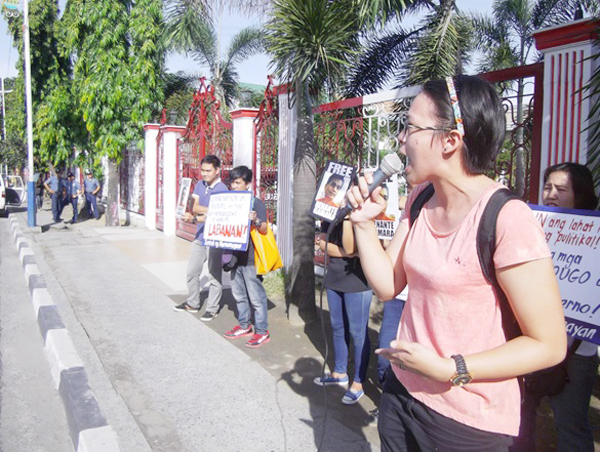On December 10, 2014, we wrote about Renante Gamara, a labour activist, who was tortured and detained on fabricated charges. He was expecting a decision from the Regional Trial Court (RTC) in Taguig City on his pending appeal to have charges against him dismissed. Gamara was arrested on April 3, 2012 in Las Pinas City, Metro Manila charged with kidnapping and murder.
 Photo: Nicolette Gamara, daughter of the victim, in protest outside the court compound.
Photo: Nicolette Gamara, daughter of the victim, in protest outside the court compound.
The court is legally obliged to resolve Gamara’s petition since his appeal was submitted for a resolution or a decision since November 3, 2014.
But RTC Judge Toribio Ilao cancelled the hearing on December 11, 2014, the same day he was supposed to render his decision on Gamara’s petition. Judge Ilao cancelled the hearing reportedly due to illness, and because his court was conducting an inventory of court cases. He reset the hearing for March 14, 2015.
Gamara, his family and his supporters appeared in court on December 11, 2014 only to learn that the scheduled hearing was again cancelled.
Yesterday, the Asian Human Rights Commission (AHRC) learned that on March 5 “another warrant of arrest for the alleged crime of murder was served on him” just ten days before Gamara’s scheduled hearing. March 14, 2015 is the deadline set for Judge Ilao to resolve whether or not to dismiss the earlier criminal case against Gamara.
In her letter to the AHRC, Nicolette Bravante Gamara, Gamara’s daughter, wrote:
We are enraged by the continued criminalization of my father, our family, friend and colleague, Renante Gamara.
Ten days before his long-awaited scheduled hearing, which is essentially the deadline for the Pasig RTC Branch 266 in Taguig City to resolve the Motion to Dismiss the Kidnapping with Murder accusation, another warrant of arrest for the alleged crime of murder was served on him.
The WOA was dated June 3, 2013 and was allegedly investigated in May 2012, months after he was detained in Camp Crame. Moreover, the alleged crime was committed just days before he was arrested in Las Piñas City.
The timing and other circumstances of the warrant are proof of its political motivation: to further criminalize, vilify and keep behind bars our dear friend, Renante.
This is the same questionable and false accusation used to arrest and inhumanely detain the then-pregnant Miradel Torres, a Gabriela organizer and a women’s rights advocate.
The AHRC has followed Gamara’s case since March 2013. In our numerous appeals, statements and press releases, we questioned the legal procedures undertaken by the investigators and prosecutors in this case. We raise our concerns on the denial of Gamara’s right to be afforded a fair trial in the criminal cases against him.
On May 24, 2013, we drew the government’s attention to Gamara’s allegations of torture by his arresting officers; the absence, if not denial of legal counsel, at the time of his arrest. For further details, please read: AHRC-UAU-004-2013, AHRC-UAU-016-2013 and AHRC-PRL-010-2013.
The Commission on Human Rights (CHR) responded to our appeals by conducting its own investigation. However, we are not aware of any action taken against those government officers accused by Gamara of torturing and illegally arresting him. The AHRC did appreciate the intervention of the CHR in this case.
During these two years, we are not aware of any other pending criminal charges against Gamara. So, we are deeply concerned that the police and prosecutors did not disclose details of the arrest warrant dated June 3, 2013 much earlier. We have yet to obtain particulars about this new charge. It is very clear that the information relevant to the issuance of this warrant of arrest—nature of the charge, the complainant, the witnesses—was deliberately concealed from Gamara. The purpose might be: to ensure that he is unprepared, could not respond to the charges on time, and to assure that he is kept in continuous detention.
The AHRC is of the opinion that the non-disclosure was deliberate. It is an out-right violation of his right to be informed of the nature of the charges against him. The withholding of the details of his arrest order plus the release of it only days before the court is to render its judgement on the petition of dismissal, gives rise to serious questions on the impartiality of the legal process in this case.